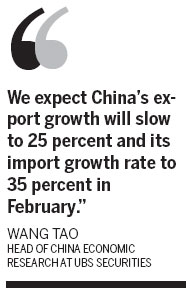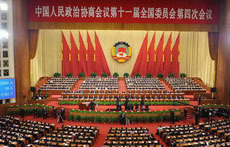Sustainable growth the key
By Xin Zhiming (China Daily)
Updated: 2011-03-06 08:27
BEIJING - China pledged on Saturday to increase imports from the least-developed countries and from those with which it has a trade surplus. The world's second-largest economy also said it will cut its domestic deficit budget as it targets a more sustainable growth track.
"We'll attach equal importance to exports and imports and encourage imports from the least-developed nations and countries we have a surplus with," said Premier Wen Jiabao as he delivered the annual government work report to the nation's 5,000-plus top legislators and policy advisers.
| ||||
As the world's largest exporter, China boasts a large trade surplus but faces complaints from some nations.
China has started to shift its focus to a more balanced trade structure by reducing support for exports and encouraging imports to contribute to global economic balance.
"We'll expand imports of advanced technologies and equipment, crucial components and energy and resource products," Wen said.
His remarks show the country is a responsible one that promotes balanced global growth, analysts said.
"Increasing imports from the least-developed countries will help their economic growth and reduce the number of poor people in those countries," said Zhang Xiaojing, senior economist of the Chinese Academy of Social Sciences (CASS). The move will also contribute to global economic balance, although developed countries need to do their part, said Zhang.

As China's trade-adjustment policies gradually take effect, its trade surplus has been in decline.
Economists, including Li Daokui, academic adviser to the central bank's monetary policy committee, and those from foreign investment banks including Nomura Securities, have predicted that the trend of falling surplus-GDP ratios will continue in the next two years.
"We expect China's export growth will slow to 25 percent and its import growth rate to 35 percent in February," said Wang Tao, head of China Economic Research at UBS Securities.
"The trade surplus, as a result, will further contract to about $1.4 billion."
While restructuring its trade sector, China also promised to cut the ratio of fiscal deficit to GDP this year, a move that analysts said shows a more prudent stance from the central government, despite its official wording of adopting a "proactive" fiscal policy.
China will budget a fiscal deficit of 900 billion yuan ($137 billion) this year, or 2 percent of its GDP, down from its target of 1.05 trillion yuan and about 2.5 percent of GDP in 2010, according to a Ministry of Finance report delivered to the legislators' meeting for approval on Saturday.
The report said that China would aim for revenue growth of 8 percent and expenditure growth of 11.9 percent this year. Last year, revenues increased 21.3 percent and expenditures 17.4 percent year-on-year, the report said.
"Such an arrangement reflects the requirement of sustainable fiscal growth," the report said.
"From the report, we can see that the fiscal stance has become more prudent, although policymakers have vowed to adopt a proactive fiscal policy," said Zhang of CASS.
The country's fiscal revenues increased rapidly in 2010, justifying a relatively high fiscal deficit, he said. This year, the revenues may not increase that much, making it natural that the country reduces its deficit budget for this year, he added.
The finance ministry admitted in the report that fiscal revenue growth may slow this year due to exports possibly slowing down as well as a weakening of the auto market and tax reforms, especially those targeted at reducing the tax burdens on small and medium-sized enterprises.
Because its ratio of fiscal deficit to GDP is budgeted to fall this year, the country's fiscal deficit-GDP ratio will be much lower than the internationally recognized warning line of 3 percent.
The international community also uses the ratio of a country's outstanding national debt to GDP to gauge its debt risks. In China, it was about 17 percent in 2010, according to figures provided by the finance ministry. The international warning line is about 60 percent.




